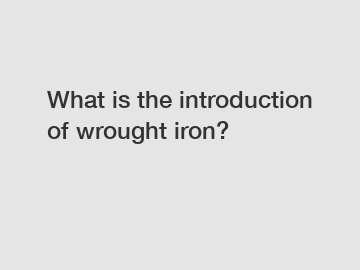What is the introduction of wrought iron?
Properties of Wrought Iron.
Wrought iron is an alloy of iron that contains a low carbon content, usually less than 0.08%. This low carbon content gives wrought iron its unique properties, making it highly malleable and ductile. It can be easily shaped and formed into various shapes and intricate designs. Wrought iron also exhibits excellent tensile strength, making it highly resistant to bending and breaking.
In addition to its malleability and strength, wrought iron has a distinct appearance. It features a grain-like texture with a matte black or dark gray color. This appearance adds a touch of elegance and sophistication to any application in which it is used. Wrought iron is also highly resistant to corrosion, making it suitable for outdoor use and ensuring its longevity.

History of Wrought Iron.
The use of wrought iron dates back to ancient civilizations. Its production technique, called "wrought iron forging," involves heating and hammering the metal to remove any impurities and shape it according to desired forms. This technique was widely practiced during the Iron Age and continued throughout history, especially during the Medieval and Renaissance periods.
Wrought iron played a significant role in the development of architectural designs during the Gothic era. Its malleability allowed craftsmen to create intricate and elaborate designs in gates, railings, and windows. The use of wrought iron in these structures not only added aesthetic value but also ensured their durability and strength.
Applications of Wrought Iron.
Wrought iron finds its applications in various industries, including construction, interior design, and manufacturing. One of its most prominent uses is in architectural projects. From grand staircase railings to ornate gates and fences, wrought iron adds character and style to buildings of all types. It is often used to create unique and eye-catching pieces that become focal points in any structure.
The furniture industry also utilizes wrought iron extensively. From patio sets to beds and tables, wrought iron furniture offers durability and an elegant aesthetic. Its weather-resistant properties make it suitable for outdoor furniture that can withstand the elements for years without deteriorating.
Wrought iron is not limited to large-scale projects. It is also commonly used in the production of smaller decorative items such as candle holders, wall art, and sculptures. These pieces add a touch of sophistication and uniqueness to any interior or exterior space.
Conclusion.
In conclusion, wrought iron is a versatile, durable, and attractive material that has stood the test of time. Its unique properties, including malleability, strength, and corrosion resistance, make it a popular choice for various applications. Whether in architectural designs, furniture, or decorative items, wrought iron adds elegance and character to any space.
If you are interested in exploring the possibilities of wrought iron for your next project or would like to learn more about its applications, please do not hesitate to contact us. Our team of experts is ready to assist you in finding the perfect wrought iron solution for your needs.
Are you interested in learning more about spiral staircase cast iron, wrought iron greenhouse, Wrought Iron Gazebo Factory? Contact us today to secure an expert consultation!


